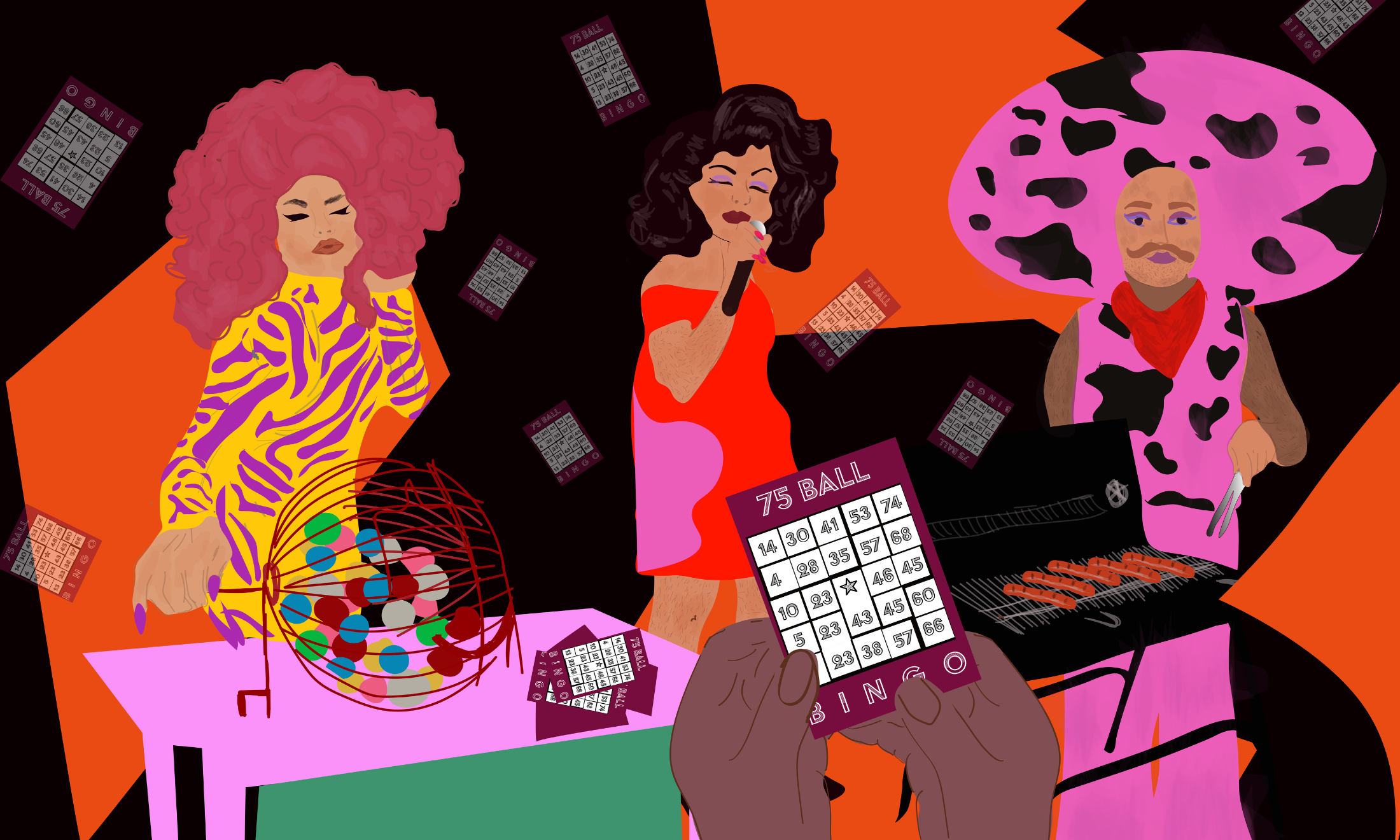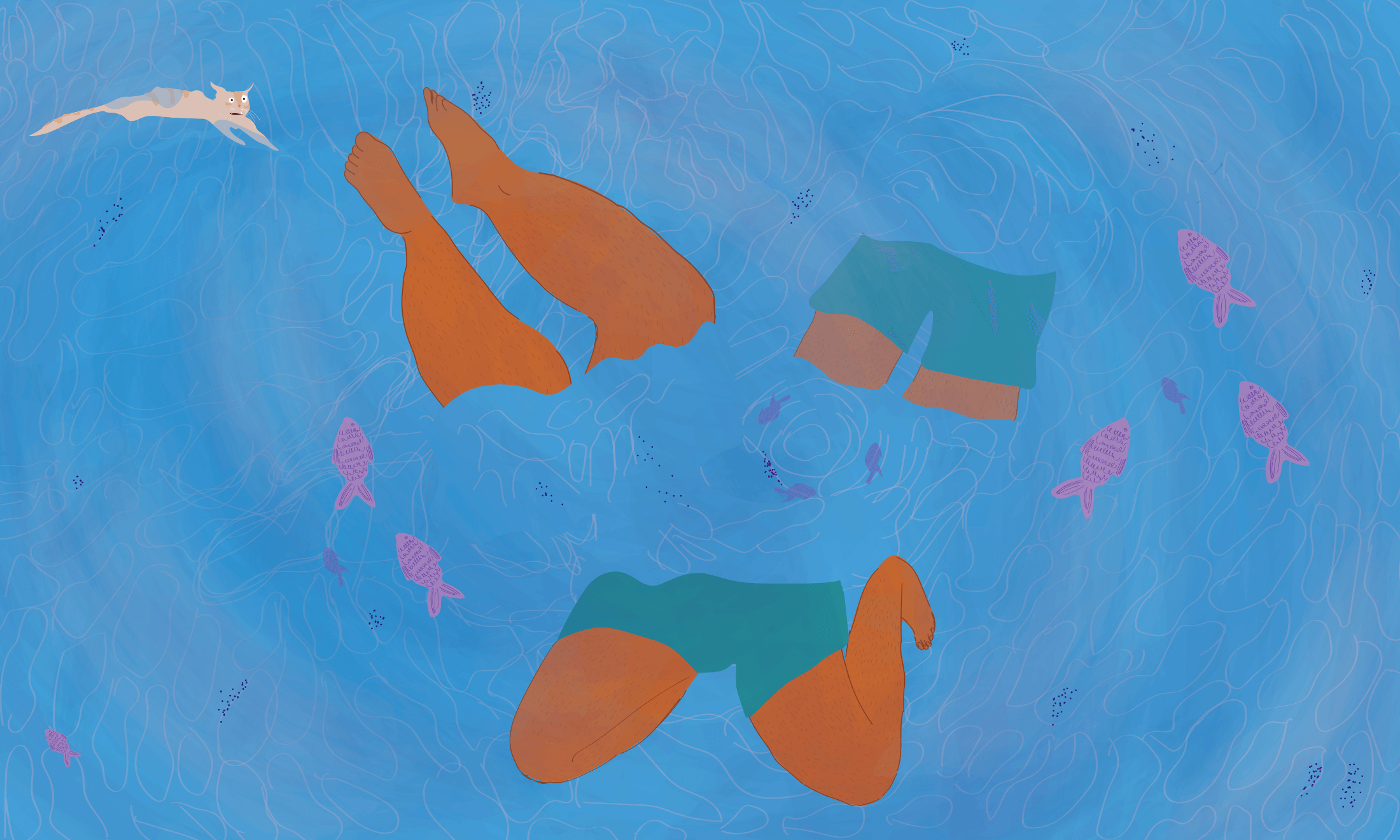
Hayfaa Chalabi
Against the binary: Embracing community at a drag bingo show in rural Wales
The word ‘community’ is thrown around a lot. But hosting a drag bingo night in a small Welsh town made me reflect on what queer community really means.
Yas Necati
24 Oct 2022
We gathered in the back room of a community space near a historical site for Welsh independence, and hosted, as far as we know, the area’s first ever drag bingo night. The room was filled with buzzing queer and trans folk. All around me, loved ones were creating magic: serving drinks by the old wooden door, handing out bingo sheets, taking pictures, testing glitter curtains. In the entrance hall Hazel, a dog companion of one of my pals, rested on a grand old chair, softly lifting her head and greeting people affectionately.
As much as I wanted to just sit and take everything in, it was almost showtime, so I zipped around trying to find a mirror to paint on my moustache. It was harder than it sounds – I couldn’t walk two steps without bumping into someone I was excited to see. As I tucked myself away in the upstairs bathroom to do my ‘stache and eyebrows, camp pop music pounded through the floor, meeting my feet and making my toes tingle.
“People often talk about rest and joy being found in ‘community’, but what is it and how do we find it as adults?”
On the way back downstairs, I bumped into someone I’ve been crushing on, looking incredibly hot. Suddenly shy, I scurried away, to disappear backstage where my pals were preparing vegan sausages for their cowboy act. Between the four of us, we were performing pirates, cowboys, DIY bros and Turkey’s biggest popstar. And then of course there was the bingo, hosted by Penny Comequick. As Penny introduced the night, you could feel the anticipation of the audience through the curtains. The whole evening, the small group of us who organised the show kept trading glances that said, “I can’t believe we did this”.
That night, I felt community so strongly, from the folks who came to the venue hours earlier to help move tables and hang fairy lights, to the people who’d travelled from neighbouring towns to be there, to the pal who made sure there were virgin mojitos on offer after I’d spoken to her weeks before about how I’ve been struggling with alcohol again. I felt part of something bigger which made me reflect on what that actually means. People often talk about rest and joy being found in ‘community’, but what is it and how do we find it as adults?
“I felt my loved ones rally around me, together as a network, in a beautiful way that got me through the physical and emotional toll of that sickness”
It made me think about the first time I had Covid-19 in the summer of 2021, when loved ones cooked for me or brought food to my door. My cat also went missing that week, and a friend printed out a bunch of lost flyers for me and hung them on my street while I was isolating in my room (don’t worry: Myra is home safe now!). This was one of the first times in London that I felt something different than being connected individually to lots of wonderful friends. Instead I felt my loved ones rally around me, together as a network, in a beautiful way that got me through the physical and emotional toll of that sickness. It made me think about the difference between being in friendship and being in community, where the crossover and separation is and how we put community into practice.
Those were all ponderings I was having when I moved from the city to rural mid-Wales last year. It was daunting moving somewhere I’d only ever visited once before, and to a place where I had very few relationships. I’d heard there was a strong queer community there, but I was sceptical. The word ‘community’ is thrown around a lot in different contexts and sometimes it just means there is a high concentration of queer people in a space. It doesn’t necessarily mean that all will feel community there. In fact, I don’t think my ingredients for community necessarily require big groups of people. I’m more excited by overlapping relationships that feel safe, mutually caring, solidarity focused and supportive.
“I’ve learnt more about community over this past year than I ever have done before in my life”
Of course, community isn’t something that’s one-way or extractive. The folks who looked after me when I was sick were folks I have shown up for too. But it also shouldn’t be transactional; it’s not about counting when and where we are supporting each other, but rather it’s about collectively directing support and resources where they are most needed. In our small Welsh town, a group of us recognised a few needs – one to raise money to help folks who are founding a local youth club, another to create more queer spaces, and safer stages to celebrate queer performers. We brought these things together into a drag bingo fundraiser, and as well as having a rich, celebratory and memorable night, we also raised over £600 for the new youth club.
My anxiety about moving to a new place and entering a new community was dimmed soon after I arrived. If anything, I feel like I’ve learnt more about community over this past year than I ever have done before in my life. My partner and I were adopted pretty quickly when we moved, as the baby gays of our queer family, and I’ve been grateful to live amongst folk who prioritise gentleness, accountability, rest, care and imagination. This really does seem like what community feels and looks like in practice, and I can’t wait to keep being in it, and carrying what I’ve learned with me wherever I go next.
The contribution of our members is crucial. Their support enables us to be proudly independent, challenge the whitewashed media landscape and most importantly, platform the work of marginalised communities. To continue this mission, we need to grow gal-dem to 6,000 members – and we can only do this with your support.
As a member you will enjoy exclusive access to our gal-dem Discord channel and Culture Club, live chats with our editors, skill shares, discounts, events, newsletters and more! Support our community and become a member today from as little as £4.99 a month.







